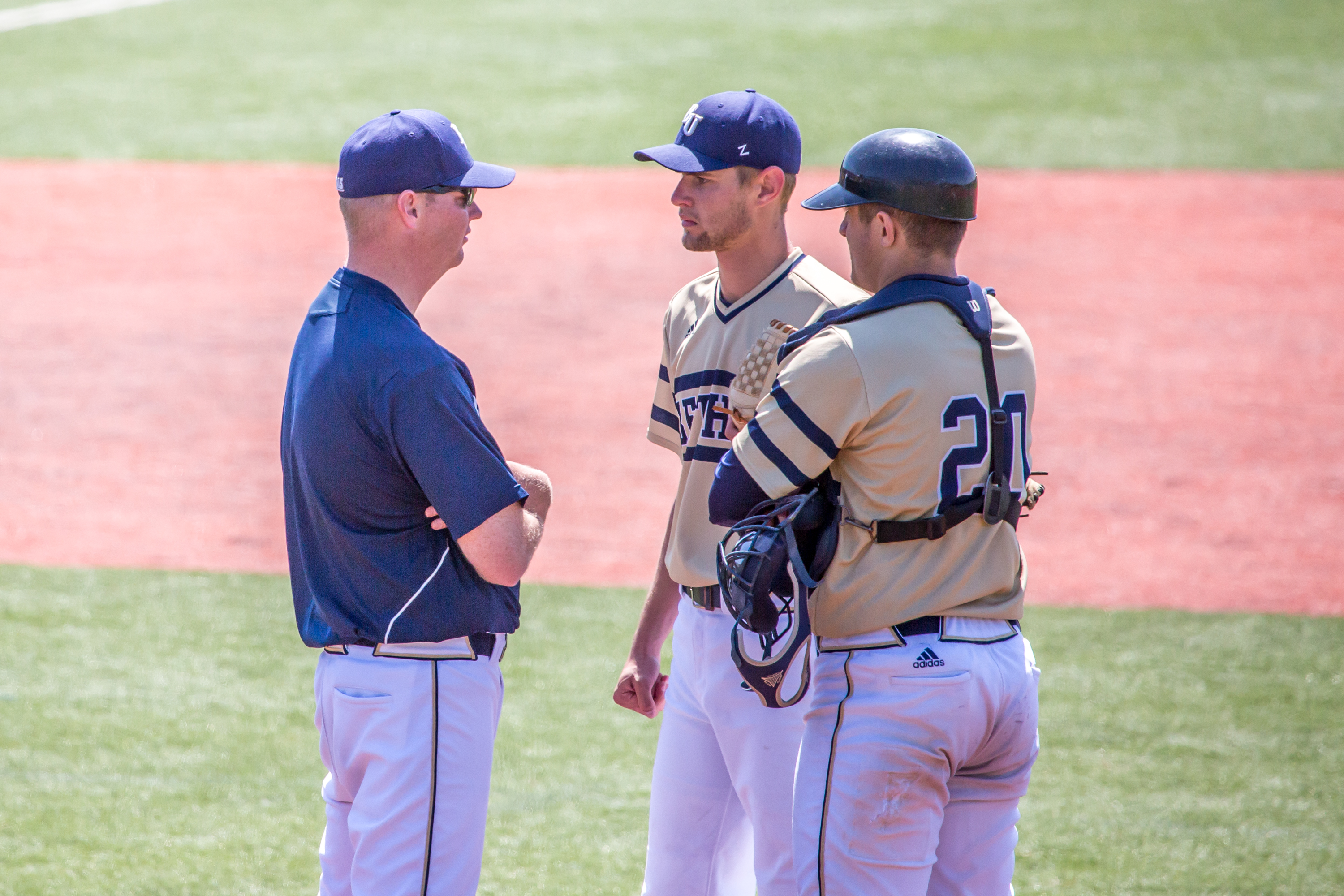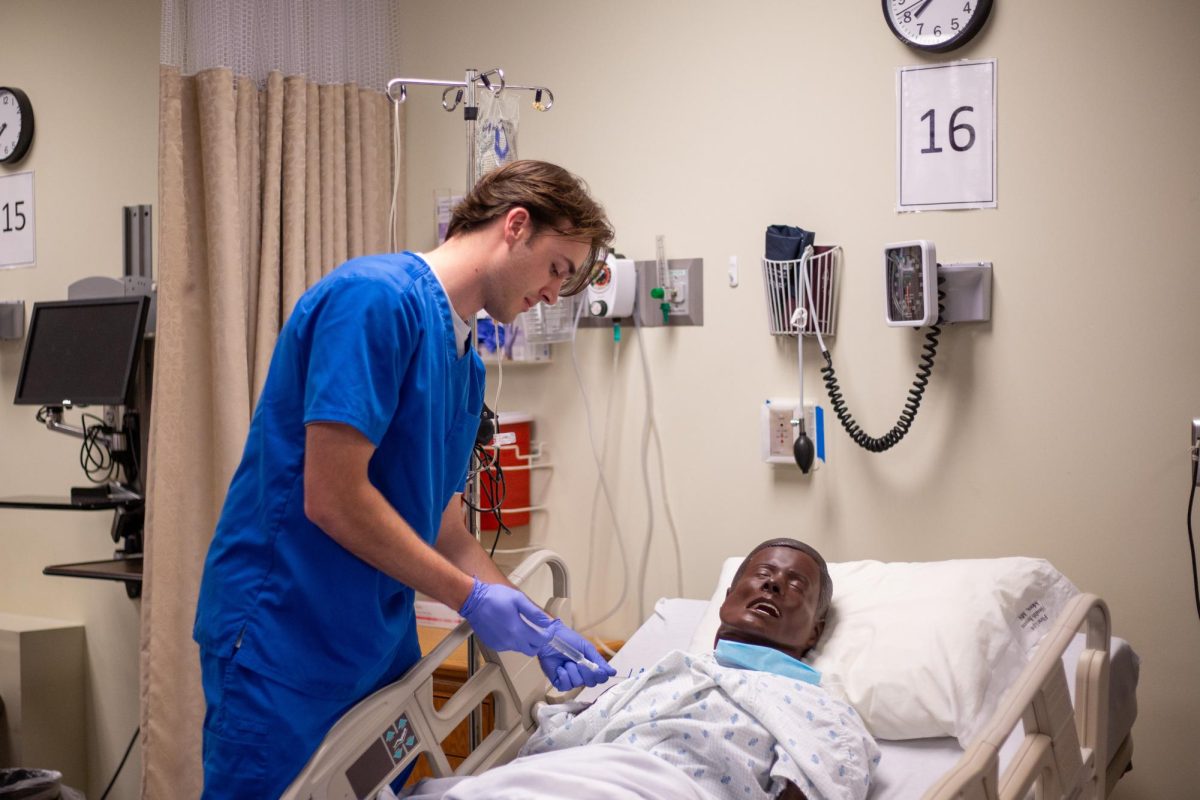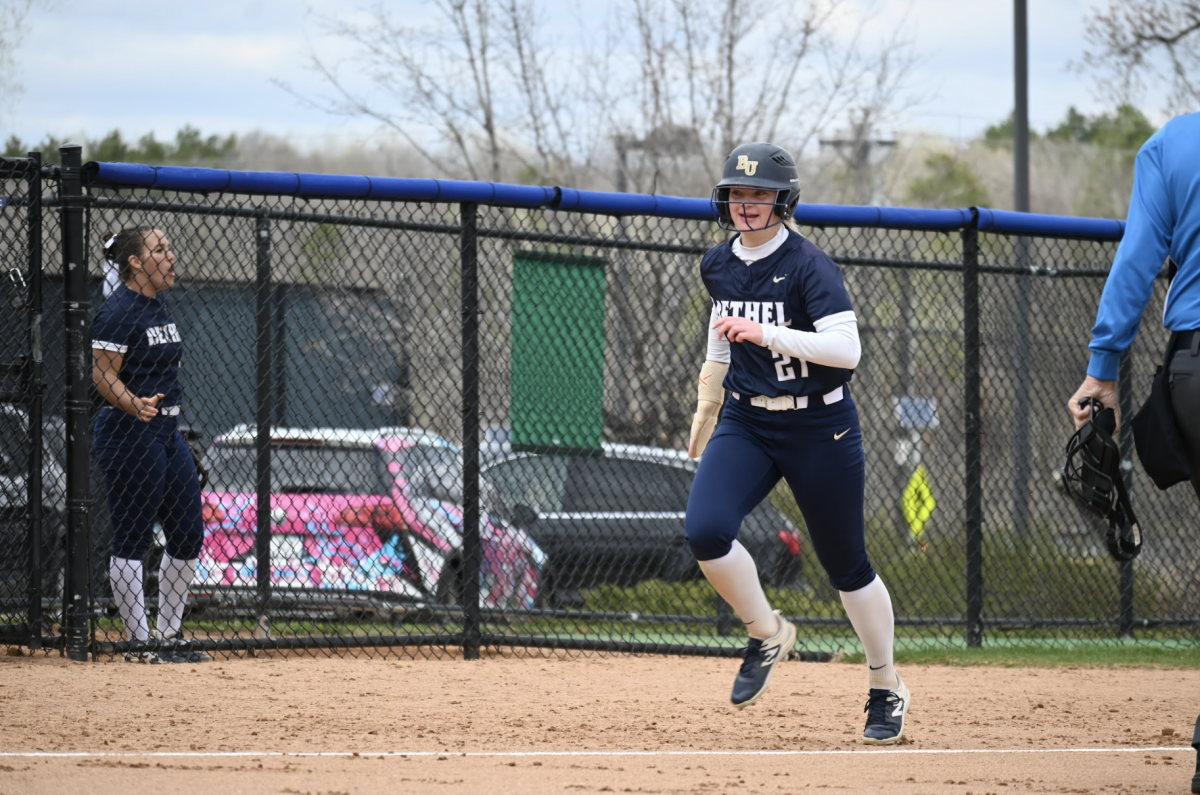Baseball used to be the only steady thing in Tyler Heitmann’s life. That is, until baseball brought him to a place where he found permanent stability.
by Jared Nelson
Tyler Heitmann toed the free throw line on the brink of a Middle Border Conference title. Heitmann’s Baldwin-Woodville Blackhawks trailed Somerset High School by 2 with 1.3 seconds left. At the line looking to send the game into overtime, Heitmann sent his first free-throw up, just as he’d practiced countless times.
Money. Whew.
The second, now with the added pressure of the game- tying attempt, was up. And short. Heitmann knew it right away and leapt off the line as soon as the ball struck the front-iron, snatching it down amid a sea of Spartan defenders.
Without hesitation, Heitmann pounded one dribble, lofting the ball back up and in as the final buzzer sounded, giving the Blackhawks the title and crowning Heitmann the hero.
That night would produce what he still calls “the moment,” but the scene wasn’t a mob of teammates in a packed gym. It was the front seat of Kermie, his green, ’98 Chevy Lumina with 300,000 miles.
Western Wisconsin was unseasonably cold that January. After the game’s storybook ending and ensuing celebration, the 18-year old Heitmann decompressed. Kermie sat idling in his driveway and Heitmann idled in Kermie’s driver’s seat. Thinking.
The silence broke abruptly as his phone rang in in the cupholder.
“Hello?”
“This is Brian Raabe, head baseball coach at Bethel University.”
Athletics had always been a temporary escape from the chaos and uncertainty of home life for Heitmann, but he was about to discover a permanent fix.
 The only constant in Tyler Heitmann’s childhood was change. Born in Stillwater, he lived in New Richmond, Wisc. until he moved north to Baldwin in first grade.
The only constant in Tyler Heitmann’s childhood was change. Born in Stillwater, he lived in New Richmond, Wisc. until he moved north to Baldwin in first grade.
He grew up barely knowing his father who lived about an hour away in the Twin Cities. Heitmann’s mother, amid a myriad of health issues and relational shortcomings, worked hard to raise Tyler and his younger brother, who is afflicted with autism. She did everything she could, he said.
“I’d always have a new pair of basketball or baseball shoes. That’s your pride and joy. You always look forward to lacing em up.”
Heitmann was never really sure what home was. His mom was in and out of the house, so Tyler would live with friends, coaches and neighbors for months at a time. He estimates that he lived in 10 to 15 different homes with at least six different families by the time he graduated high school.
When he was 15, Heitmann felt he needed to make up for lost time with his father, so he and his brother moved in with his dad in White Bear Lake, Minn. It didn’t take long for that reconciliation to spoil, however, as abuse and court proceedings marred the relationship. Heitmann was failing classes and was forced to take summer school. Failed there, too. Alcohol and drugs weren’t just coping mechanisms for Heitmann, they were norms. He contemplated suicide. After two rocky years with his father, Heitmann moved back with his mother in Baldwin, but things were far from normal.
Because he transferred high schools, Heitmann wasn’t eligible to play football for Baldwin.

“That was rock bottom,” he said.
Athletics had always been his anchor. A self-titled “little kid with a big dream,” Heitmann clung to sports like a rock climber to the side of a mountain. His past, present and future were sports. An appeal granted Heitmann eligibility heading into basketball season, but not before his football season was lost. With the return of athletics came some semblance of normalcy.
Heitmann, a two-time All-Conference performer in both baseball and basketball, had a number of schools interested in his services in college. He planned to walk-on at Winona State as a pitcher, but that call from Coach Raabe planted a seed. One call turned into two. He heard about Raabe’s past as a professional and opened up about his own journey. There was no miracle message from Raabe, just openness and authenticity. College loomed, and Heitmann thought Bethel may provide stability that had been so elusive. Two weeks before Welcome Week of 2012 and by what Heitmann now calls one of many of God’s miracles, he was accepted and enrolled at Bethel University.
In late autumn of 2012, Heitmann sat at a long table in the Dining Center with his battery-mate, sophomore Grant Anderson. Sitting across from one another, the two had been speaking for well over an hour. The few students that ventured into the Dining Center for a midday meal had left, leaving Heitmann and Anderson alone. It wasn’t the rst time the two had spoken; they did it often throughout that autumn. As was customary, they were discussing matters of faith. Heitmann said Anderson was intentional about sharing the Gospel with him from the day he stepped on campus. He received a Bible from Anderson at the beginning of the year.
“Grant sacrificed his time to be with me and share things with me,” Heitmann said.
Heitmann was especially inquisitive that afternoon, attempting to absorb all he could of Anderson’s message. Anderson grabbed a napkin from the middle of the table and began to write. “Through faith, by grace, for good works,” the message read. All of a sudden, everything clicked for Heitmann. He’d been to church seldom as a child, but never took faith seriously until these conversations with Anderson.
“It was a light-bulb moment,” Heitmann said. “Everything I’d heard about the Gospel up to that point made sense now.” He still has the napkin—tucked in the pages of the Bible that Anderson gave to him, sitting on the nightstand next to his bed.
Heitmann was saved that afternoon and a new journey started. Faith-based conferences became destinations as his thirst for Christ was insatiable.
“The next summer, God started wanting to use me. I was able to grow and blossom,” Heitmann said, apologizing for what he called “lame terminology.”
Royal pitching coach Tim Beasley introduced Tyler to Tom Johnson.
Sporting long stirrups and curly golden locks, Johnson spent the better part of the 1970s pitching out of the Twins’ bullpen, finishing his career with a 3.39 ERA thanks in large-part to a knee-buckling slider. A shoulder injury in 1979 ended his career early, but Johnson was not defeated. He attended seminary and began working at Church of the Open Door in Maple Grove. After about 20 years on the ministry team, Johnson and his wife, Debbie, relocated to Bratislava, Slovakia, where they currently reside, tasked with running faith-based athletics camps with GoodSports International.
Johnson hoped that Heitmann would spend the summer as an intern for GoodSports, serving and mentoring young athletes in Slovakia.
“I knew I was supposed to be there,” Heitmann said when presented with the opportunity. He started raising money immediately. “If God wants them to and you’re willing, things will happen.”

For a kid lacking solid roots who had faced the challenges Heitmann had, spending a summer in Slovakia was about as daunting as a trip to the petting zoo, but he was stretched emotionally and spiritually throughout his time abroad. He missed home and felt at times like God wasn’t using him. Selfishness crept in and he had forgotten why he’d come in the first place. Just like his childhood, though, Heitmann clung to the two things he knew best: friends and baseball.
He’d grown close with Endy, the best ballplayer in Bratislava. Tyler and Endy spent everyday together, making sense of life on the diamond and trying to make sense of life of it. They understood each other and could relate to how disheveled home life can be. Endy’s father was in prison for murdering his mother.
Heitmann speaks with the enthusiasm of a child when he talks about Adam, his Slovak roommate. It was just the two of them, alone in the living room, when Adam committed his life to Christ.
He played some ball there, too, traveling around Europe on the weekends with the Slovakian National Team. He learned directly from the former major leaguer, Johnson, and said his pickoff move benefitted from the individual lessons. European hitters hadn’t seen anything like Heitmann. He didn’t surrender a run the entire summer, and even spent a few innings at shortstop.
“Number 84 out there on the hill,” Heitmann reminisced. “That was pretty sick.”
Back at Bethel, Heitmann said his experience in Slovakia had a profound effect on his post-graduate plans. He’s always wanted to help underprivileged youth through athletics, but working with the second-world youth in Slovakia solidified this desire.
“I thought I had it tough growing up. This opened my eyes and humbled me,” he said. “I felt so alive when I was with those kids, spending time with them.”
The temperature didn’t get out of the teens on the evening of January 14. Holed up in their dorms just before 8 p.m., students prepped for interim midterms taking place the next day. For the 40 student-athletes slowly filing through the doors of the SRC, however, class the next day couldn’t seem further away. The reigning champions of the MIAC had practice. Coach Beasley calls it captain’s practice, but Heitmann doesn’t like the word “captain.” He prefers “leader.”
Regardless of the vernacular, Beasley said Heitmann was in charge. That’s not up for debate.
At 6’3” and just shy of 180 pounds, Heitmann is long, but not lanky. He speaks with a northern accent and syntax you’d expect to find at a hockey rink, not a baseball diamond. He begins his warmup, standing 15 feet away from his partner, tossing the ball with an effortless flick of the wrist. For the early favorite for MIAC Pitcher of the Year, these are the ABCs, yet his demeanor is that of a closer in the World Series. There is deliberateness in every movement.
He backs up, 50 feet, then 60, each throw with a little more pace than the last, until the ball is jumping out of his hand like a cannon ball leaving the side of a pirate’s ship. The added distance doesn’t seem to add a challenge, though, as Heitmann’s partner hasn’t moved an inch to catch a wayward throw.
Expectations for the Royals, coming to of their first-ever conference title, are sky-high. The pressure is on Heitmann, too, who made a strong case for Pitcher of the Year last season, finishing first in the league in wins and strikeouts, third in innings-pitched and fourth in ERA.
The physical part of the game had never really been an issue, but, according to Heitmann, the most recent off season spent in the Northwoods League did wonders for the mental side of the game.
It was July 7, and Heitmann climbed on the hill for his first start with the Willmar Stingers. He was surrounded by scholarship players and future professionals in the best amateur league in the Midwest. He’d taken his lumps. He’d been cut once and doubts continued to creep in, telling him that he wasn’t good enough to compete at this level.
On that night, however, Heitmann was rolling. “Absolutely lights out” through five innings, he said. There had been moments where he’d pitched well for the Stingers, but this was different. “They weren’t touching me,” he said.
Heitmann came out for the sixth inning against the Madison Mallards to warm up and skipped one to the catcher, forcing him to turn his glove over and field it as it bounced, splattering dirt just in front of the plate. Apparently irked by Heitmann’s brief misstep, the catcher fired a fastball back to the mound, right at Heitmann’s neck. He caught it, but was rattled.
“It threw me off the rest of the game, just a disaster,” Heitmann said. The rest of the game for Heitmann only lasted a third of an inning, but the damage was done. He surrendered three runs and left the bases loaded. Credited with the loss that night, Heitmann took away a lesson about what he’s capable of when he’s dialed in mentally, and how bad things can be when he’s not.
It was also a microcosm of the social climate he experienced all summer. Selflessness, or good juice as Heitmann calls it, wasn’t present on the bus, in the clubhouse or on the field. Alcohol was rampant, sex wasn’t a private matter for his teammates and strip club visits were a regularity for players and coaches.
“I didn’t feel like guys had my back,” he said. He would look forward to getting away from the team to spend time with his host parents, Bonnie and Lyle took him in, filling the void left by the broken family of Heitmann’s childhood. He spent a lot of time with Bonnie and Lyle’s nearly 20 grandchildren. They remain in contact, sending Heitmann packages of sweets and well wishes during finals weeks.
Heitmann finished the summer strong, making five more appearances for the Stingers, highlighted by his last appearance; a 6-inning outing in early August where he struck out seven and surrendered just one run. Beasley made the trip west to watch his ace in action that night.
“He was lights out,” he said, adding that it’s all between the ears for Heitmann. What Beasley witnessed the evening of August 9, as Heitmann made the Waterloo Bucks look like a tee-ball team, confirmed his potential. “When he’s in the right mindset, he’s every bit as good as anyone,” Beasley said. “I saw it and I’m so glad I did.”

Nobody recognizes his mental shortcomings more than Heitmann himself. He’s come a long way since the 7 innings of dirt kicking, fence punching and cooler tossing his freshman year, but admits that he still has work to do. He’s uncertain if his immaturity was a result of his upbringing, but is confident in the people who will shape his future. There are the players who came before him, took him in and preached the culture of selflessness, as well as the coaches who make Bethel a place he never wants to leave.
“My coaches are my role models and positive influences,” he said. “Once I got to Bethel, I looked at Beasley and Raabe as my dads.”
So for the little kid with a big dream, who knows nothing but change, Bethel is the first place that feels like home.

![Nelson Hall Resident Director Kendall Engelke Davis looks over to see what Resident Assistant Chloe Smith paints. For her weekly 8 p.m. staff development meeting in Nelson Shack April 16, Engelke Davis held a watercolor event to relieve stress. “It’s a unique opportunity to get to really invest and be in [RAs’] lives,” Engelke Davis said, “which I consider such a privilege.”](http://thebuclarion.com/wp-content/uploads/2024/05/041624_KendallEngelkeDavis_Holland_05-1200x800.jpg)

















